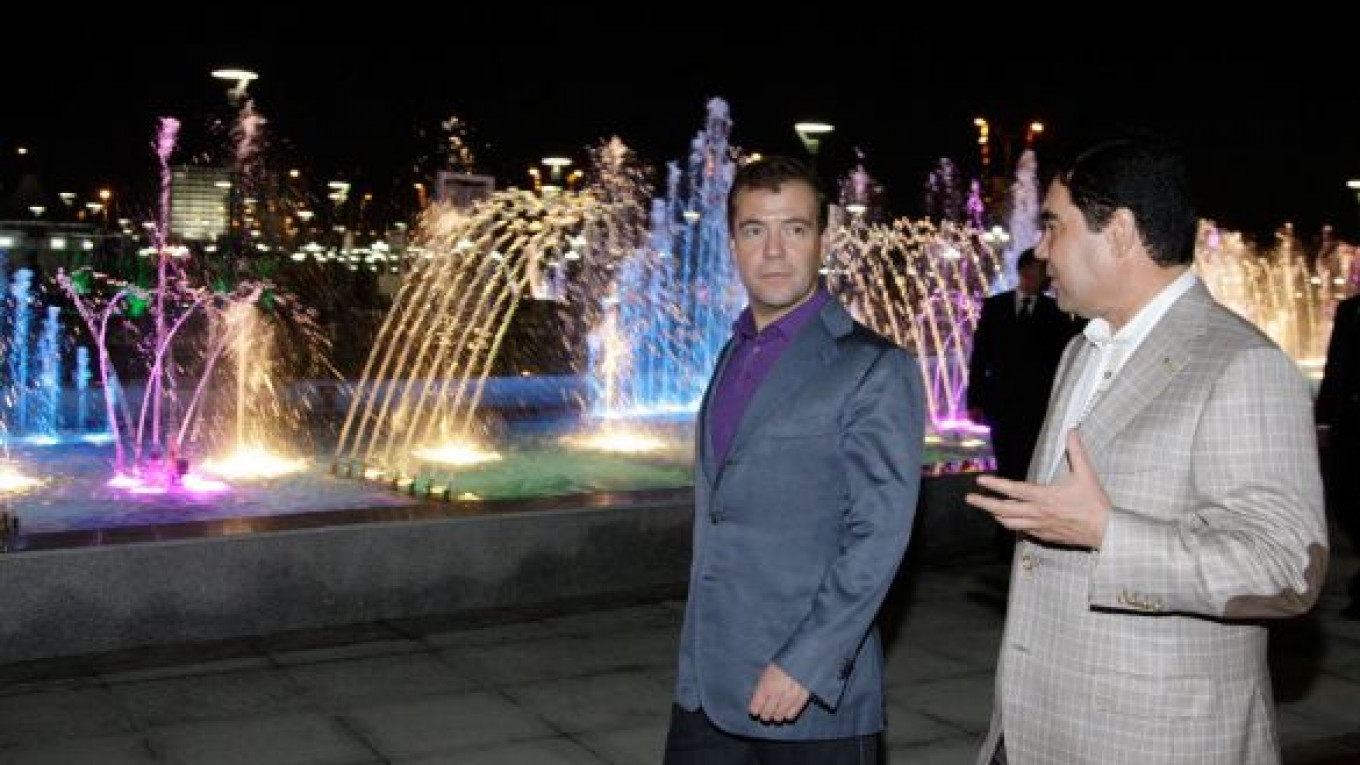Turkmenistan and Russia bolstered their natural gas relationship on Friday during a visit by President Dmitry Medvedev to his counterpart Gurbanguly Berdymukhammedov, with both sides hedging their bets as the Chinese market grows and the European one shrinks.
Berdymukhammedov was clear in his welcoming comments to Medvedev, in the port city of Turkmenbashi, that his country would like Russia to consider taking more gas.
“We are ready to expand the volume of [gas] exports,” he said, according to the Kremlin’s web site.
Medvedev allowed his energy tsar, Deputy Prime Minister Igor Sechin, to respond in detail. Sechin said Gazprom may consider upping its purchase of Turkmen gas from the current 10 billion to 12 billion cubic meters.
“These volumes will stay … and, if opportunity permits, Gazprom will take into consideration our partner’s request. But this is a matter of corporate agreements,” Sechin said.
The current volume is still about 20 percent of what Russia was buying from Turkmenistan prior to the April 2009 pipeline explosion that halted deliveries for nine months and highlighted disputes about volume and pricing. By December 2009, Turkmenistan had commissioned a new pipeline and rerouted to China the volume of gas that Russia was no longer taking — while Russia carried on with negotiations with China to become a major gas supplier.
Sechin described the differences between the two countries’ approach to the Chinese gas market.
Gazprom is “working on different terms, since Chinese companies are lending money to Turkmenistan and participating in pipeline construction there. But we aren’t competing,” he said.
Analysts say Sechin's comments were focused much more on politics than business.
Sechin reconfirmed Russia's interest in a project aimed at delivering Turkmen gas via Afghanistan and Pakistan to India, known as TAPI.
“Gazprom may participate in this project in any role: builder, designer, partner or other,” Sechin told reporters, Bloomberg reported.
Sechin, who is also Rosneft's chairman, said the company's participation in energy exploration on Turkmenistan's Caspian shelf is being discussed.
"And now … we are talking about Rosneft joining the project. That could reduce the amount of time needed to bring the field on-stream by a couple of years," he said.
Sechin also took a shot at Nabucco, the pipeline planned to reduce Europe's reliance on Russian gas, which is in competition with the Russian-driven South Stream project.
"Taking into account the estimates by the Turkmen side and European experts, as well as world experts, the current market situation on the gas track allows us to say, and I am saying this without sarcasm, that Nabucco has no future,” he said.
Turkmenistan's role in the Nabucco project was called into doubt earlier this month when the German utility responsible for planning said it is in talks to get gas from northern Iraq and Azerbaijan, and “if those materialize, there will be no room for Turkmen gas anymore," Bloomberg reported.
Nabucco's spokesman Christian Dolezal declined to react to Sechin's comment, but said in a statement to The Moscow Times that "the project will be realized … the financing is on track," with 4 billion euros ($5.6 billion) lined up, environmental and social impact studies underway, country support agreements to be signed this year and gas supply contracts under negotiation.
Analysts are less certain about Nabucco's future and say that South Stream definitely has a speed advantage.
“I would not state with 100 percent certainty that attempts to move ahead with the Nabucco project are devoid of perspectives, but it will definitely go forward slower than Russia's South Stream,” Valery Nesterov, a Troika Dialog oil and gas analyst, told The Moscow Times.
This is due, in part, to the fact that political will in Europe, though present, is relatively weak, he said.
While increased gas exports to Russia are beneficial for Turkmenistan, they make more political than business sense for Russia, Nesterov said.
“We do not need [Turkmen] gas in principle. … It will probably go on the shelf,” he said.
Both Sechin and analysts predict a decreased European demand for gas, but by purchasing “unnecessary” gas from Turkmenistan, Russia leverages its position and prevents European demand for Russian gas from dropping significantly.
“Maintaining the existing relationships is important for future infrastructure and other projects,” Nesterov said.
A Message from The Moscow Times:
Dear readers,
We are facing unprecedented challenges. Russia's Prosecutor General's Office has designated The Moscow Times as an "undesirable" organization, criminalizing our work and putting our staff at risk of prosecution. This follows our earlier unjust labeling as a "foreign agent."
These actions are direct attempts to silence independent journalism in Russia. The authorities claim our work "discredits the decisions of the Russian leadership." We see things differently: we strive to provide accurate, unbiased reporting on Russia.
We, the journalists of The Moscow Times, refuse to be silenced. But to continue our work, we need your help.
Your support, no matter how small, makes a world of difference. If you can, please support us monthly starting from just $2. It's quick to set up, and every contribution makes a significant impact.
By supporting The Moscow Times, you're defending open, independent journalism in the face of repression. Thank you for standing with us.
Remind me later.






